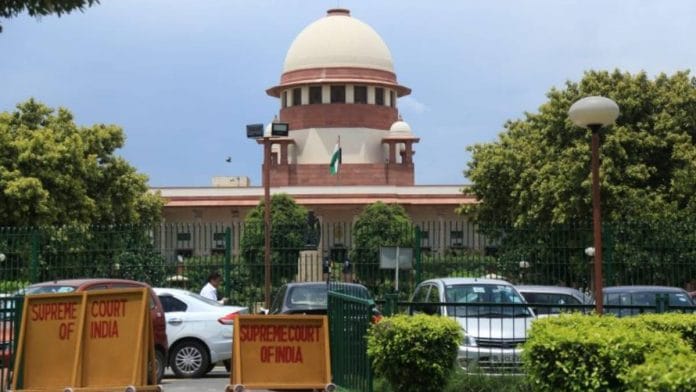New Delhi: A Supreme Court bench, led by Chief Justice of India N.V. Ramana, hit out at the government Monday for introducing a law related to the functioning of tribunals without any proper debate in either of the Houses of Parliament.
This comes just a day after CJI Ramana had lamented at the falling standard of Parliamentary debates, calling them a “sorry state of affairs” since laws were being notified without any proper debate.
The bench, also comprising Justice Surya Kant, noted that the provisions of the Tribunals Reforms Bill 2021 were similar to those that were recently struck down by the top court last month in a separate judgment concerning appointments in tribunals.
In the hearing, the CJI also quoted a reply by Finance Minister Nirmala Sitharaman, who had introduced the bill in Parliament on 2 August, where she had said that the Parliament has the last say in formulating legislations.
The court emphasised that it was not challenging the Parliament’s jurisdiction or its wisdom to frame laws. However, CJI Ramana noted that the court did want to know the reasons behind the bill containing sections that had already been declared unconstitutional by the Supreme Court and set aside.
This, he added, was not visible in the debates of the Parliament. The court also asked Solicitor General Tushar Mehta to submit the note that the government prepared when the bill was introduced. Mehta, in turn, asked for time to seek instructions on the issue.
Also read: Parliament passes tribunal reforms bill, but here’s why it could cause Supreme Court heartburn
Provisions of Tribunals Reforms Bill 2021
Tribunals are quasi-judicial institutions that deal with a variety of disputes such as taxes, service matters, administrative decisions on the environment or commercial law among others. At present, there are 19 tribunals that are functional and each has a parent law that governs its operations. The primary objective of a tribunal is to streamline justice delivery by involving experts and making quicker decisions.
The Tribunals Reforms Bill 2021 deals with the tenure of a tribunal member, age criteria and the composition of the search-cum-selection committee that makes appointments to the tribunal.
The new bill was passed by the Lok Sabha on 3 August and then the Rajya Sabha on 9 August.
It provides for a four-year term for tribunal members, fixes the upper age for the chairperson at 70 years and for the other members at 67 years. The minimum age limit for appointments is 50 years.
However, the provisions of the bill are similar to certain provisions of the Tribunals Reforms (Rationalisation and Conditions of Service) Ordinance 2021 that was declared unconstitutional last month by the top court.
With regard to the minimum age requirement, the SC had observed, “Fixing a minimum age for recruitment of members as 50 years would act as a deterrent for competent advocates to seek appointment.” It had said that advocates with a minimum of 10 years of experience should be eligible as members.
The court had made similar remarks about the four-year tenure. Both the provisions were then declared unconstitutional.
On the court’s query over the tribunals bill, Mehta said he would be able to revert after discussing the matter with Attorney General K.K. Venugopal who had argued for the central government before the bench that struck down the ordinance.
Also read: Stuck between bad rules & no appointments, tribunals finally get much-needed judicial boost
Vacancies in tribunals
The SC bench’s critical remarks came when it took up a matter regarding the vacancies in Debt Recovery Tribunals (DRT).
In the last hearing on 6 August, the bench had come down heavily on the central government over the large number of vacancies in all tribunals that have virtually left them defunct.
The CJI had then also handed over a note to Mehta prepared by the SC registry on the lack of manpower in different tribunals.
The solicitor general Monday assured the bench the process of appointments was on and was being taken seriously with the highest authorities. He informed the bench about two appointments made to the Central Administrative Tribunal (CAT) and requested for two more weeks to give the status regarding others.
“We are bound by it and will surely follow it,” he submitted.
On SG Mehta’s claim that the process of appointment was on, the bench said: “For more than a year, whenever our registry asked for the status (from the government), it was told that the appointments are under process. This ‘under process’ has no meaning.”
Unconvinced with the law officer’s response, the bench said it had “hoped” for some appointments to come through, especially after the last hearing and the note provided to Mehta.
After recording the Mehta’s assurance that the matter was under consideration, the bench gave 10 more days to the government to make the appointments, irrespective of any matter pending in the court.
(Edited by Rachel John)
Also read: Reforms in tribunals necessary but Modi govt isn’t helping judiciary by scrapping them






